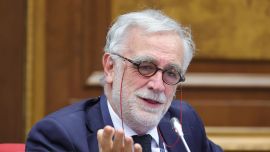Nearly seven months of quarantine, combined with a grave economic crisis and no sign of improvement in the infection rate, have deepened the so-called “grieta” in Argentina, the radical polarisation that splits the country in two.
On the one hand, there are repeated cacerolazo protests against the centre-left government led by President Alberto Fernández, who is accused of "destroying" the country. On the other, supporters of the Peronist government grow increasingly indignant about the opposition’s "irresponsibility" in encouraging marches at the height of the coronavirus pandemic.
Argentina has topped 700,000 cases with the death toll heading towards 20,000, making the country one of the hardest-hit in the world.
Daniel, a 57-year-old hairdresser, thinks that the economy, in recession since 2018, has reached an unsustainable point.
Barber shops were officially reopened a short time ago, when restrictions to tackle the spread of Covid-19 were relaxed, but he has been working clandestinely ever since quarantine was decreed on March 20.
"How am I going to live? We’ve become the laughing-stock of the world. The longest quarantine and the worst results," he says with disbelief.
Making life the priority
The impact has been brutal – in the second quarter of the year the economy of one of the world’s biggest food producers and exporters shrank 19.1 percent compared to the same period last year.
The plunge is so steep that it exceeded data from the first quarter of 2002 (minus 16.3 percent), the peak of a crisis which exploded in Argentina in late 2001.
Last year, citizens suffered one of the world’s highest inflation rates (in August, 40.7 percent year-on-year). Analysts forecast that prices will rise by 43.9 percent by the end of the year.
President Fernández defends his policies by insisting that economies "can make a comeback but lives cannot."
Psychologist Carol Diamondstein agrees.
"It’s a very complex situation, lives have been made the priority since if the health system collapses, it would be dreadful for everybody,” she warns.
"The economy plunged everywhere but we have far fewer deaths," she points out defensively.
Flashpoints
Sociologist Luciana Kirjner, 27, is a fierce critic of those who demonstrate, not only because of the risk of contagion but because "they are rocking a democratically elected government."
When taking office last December, President Fernández pledged to end la grieta, which surfaced vigorously during the 2007-2015 presidency of current vice-president Cristina Fernández de Kirchner and continued during the following four years of the centre-right Mauricio Macri administration.
There was a brief truce at the start of quarantine when most of the population lined up behind Fernández. But now "we’re at a flashpoint," asserts political scientist Carlos Fara.
Issues which were already worrying public opinion such as inflation, the runaway devaluation of the peso, crime or unemployment, now loom stronger than ever.
An opinion poll by Giacobbe & Asociados taken on July 13-15 showed the president with 42.8 percent approval, down 25 points from March when his positive image was 67.8 percent.
¿Fernández or Fernández?
Political analyst Marcos Novaro holds that "Argentina’s polarisation has become more acute with Cristina Fernández de Kirchner’s drive to advance her agenda."
"Today Alberto and Cristina are glued together, that was not so three months ago," he opines.
In Novaro’s view, the president "embraced quarantine as the easy way out and for want of any strategy, whether political or economic, he continues with it as something which has worked for him. At the same time, he needs to unite the Frente de Todos ruling coalition by adopting a more radical position."
Measures like the aborted bid to expropriate the grain exporter Vicentin or the judicial reform bill being debated in Congress provoke indignation among the opposition, which asks again and again: “Who rules Argentina, Alberto or Cristina?” while filling the social networks with endless commentary.
The government argues that the judicial reform bill will guard against power being concentrated into a handful of few federal judges. But those against argue that the aim is to control criminal justice and benefit Fernández de Kirchner, who has been indicted in nine cases, mostly for corruption.
Argentina’s persistent polarisation has also generated an avalanche of fake news. Recent stories have claimed that the government has stopped issuing passports "to prevent Argentines from leaving" or that the president said that Argentina "must follow the Venezuelan model."
Both were shared thousands of times. But according to AFP's fact-checking service, the first time is "false" while the second is a "not registered."
related news
by María Lorente, AFP


























Comments